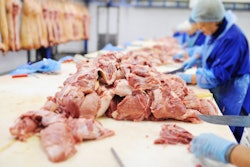
Since the start of 2023, there have been 3 outbreaks of African swine fever in commercial pigs in South Korea.
Presence of the African swine fever (ASF) virus has been confirmed on three more farms in South Korea, according to the agriculture ministry.
First, six out of a group of 20 pigs tested positive for the ASF virus at a slaughterhouse. After confirmation, around 8,000 pigs were culled at the farm of origin in Pocheon. This county is in the northwestern province of Gyeonggi. In the surrounding area, authorities temporarily suspended transportation of all swine as well as vehicles on to and from pig farms, according to the usual routine. Along with extensive disinfection, these processes aim to break the spread of infection.
This was the first ASF outbreak among South Korea’s domestic pigs for almost two months.
Within a few days, inspections revealed the virus was present in around 2,400 pigs at another linked premises. Located in Cheorwon county in the northwestern province of Gangwon, this unit finished growing hogs. To prevent further spread of the virus, a total of more than 16,400 pigs were culled at the farm, two linked to it, and another unit within 500 meters.
Around 10 days later, the ASF virus was detected at a further farm in Gyeonggi. In Gimpo county, it had around 2,500 pigs.
Officials have been closely monitoring the health of pigs at 10 premises within 10 kilometers of the infected farm.
These three latest outbreaks brings South Korea’s total ASF outbreaks in domestic pigs since 2019 to 31. Of these, 14 occurred in 2019, two in 2020, five in 2021, and seven in 2022.
All these outbreaks have occurred in the north of the country in just three regions. There have been 13 outbreaks in each of the provinces of Gangwon and Gyeonggi, and three in the Incheon city area.
Continuing outbreaks in South Korea’s wild boar
Since 2019, authorities in South Korea have confirmed 2,795 ASF cases in wild boar, reported Pig People on January 27. This was 93 more cases than on January 2.
Among the wild population, most cases have been located in Gangwon and Gyeonggi. However, infected animals have also been found in adjacent provinces. There have been almost 300 cases in North Chungcheong, and 114 in North Gyeongsang.
Further cases confirmed in Malaysia
In the past two weeks, the veterinary authority has officially reported further outbreaks of ASF in Western and Eastern Malaysia.
According to the latest notifications to the World Organisation for Animal Health (WOAH), 13 further outbreaks were confirmed in the Western region (Peninsular Malaysia).
Of these, seven occurred on farms, directly affecting 42,300 animals. Outbreaks began in November and December 2022 at the premises in the states of Penang, Perak, Johor and Pahang.
Also confirmed in this report were five new ASF cases in native bearded pigs, and 17 in wild boar.
Since ASF was first detected in Western Malaysia in October 2021, it has impacted almost 76,000 domestic swine, along with 57 wild boar and five bearded pigs.
Latest updates from local media indicate the continuing spread of the disease in this region.
Affected in Penang state have been 18 farms with more than 48,000 pigs, reported Malaysia Now last week. In the worst affected of the three districts, around 4,200 animals had been culled as part of the stamping-out process of disease control. According to this source, affected owners will receive MYR400-800 (US$94-190) for each adult pig culled.
Meanwhile, in Eastern Malaysia, two farm outbreaks starting during the month of October have been reported to WOAH.
Involving a total of 152 domestic pigs, the affected premises were located in the states of Sabah and Sarawak.
First cases of ASF were detected in this region almost two years ago. Since then, 75 outbreaks have been officially confirmed. Directly impacted have been 4,345 swine, along with 72 wild pigs.
Bhutan, Thailand record new outbreaks
WOAH has been notified by the veterinary authority in Thailand of a further seven outbreaks of ASF.
Starting between November 16 and December 25, these all involved village herds in different provinces. Numbers of animals affected are not fully reported.
Among these latest outbreaks are the first in the central province of Phetchaburi, and Krabi in the Southern region.
Since Thailand’s first cases were identified in November 2021, outbreaks have been reported in all six regions, and in 36 of the 76 provinces. The index outbreak involved pet pigs but all subsequently reported outbreaks have involved village herds, and not commercial farms.
This month, Bangkok Post reported that the authorities had destroyed almost 724 metric tons of illegally imported pork. The largest amount ever seized by the country’s officials, the meat originated in Brazil, Germany and Italy, but without quality inspection. It is not reported whether the meat was contaminated with a virus.
In Bhutan, a seventh ASF outbreak since November 2022 has been reported to WOAH.
Latest cases were detected on a farm with 1,159 pigs in Sarpang. There have been previous outbreaks in this southern district, which borders India.
ASF developments elsewhere in Asia
So far this year, ASF outbreaks in Vietnam are well below those reported in previous years, according to the latest update from the United Nations’ Food and Agriculture Organization (FAO).
However, cases have been confirmed in four provinces — two in the Mekong Delta region in the south of the country, one in South Central Coast, and one in the North East region.
Citing local media in Indonesia, FAO reports there has been another increase in ASF-related mortality in several districts in East Nusa Tenggara Province. The disease is also suspected in North Sumatra Province.
In the southernmost province of Thailand, carcasses of 10 wild pigs have tested positive for the ASF virus, according to FAO.
ASF continues to spread in the province of Iloilo, reported the Philippine News Agency in mid-January. The Department of Agriculture is calling on the public and media to raise awareness of the disease, particularly among backyard hog raisers. Commercial and semi-commercial farms generally manage biosecurity procedures very well, according to officials.
Meanwhile, authorities in other provinces in the Western Visayas region continue to urge vigilance, and warn against the importation of pigs and pork products from infected areas.
In central India, there has been a rapid spread of ASF from a new hot spot for the disease in the Damoh district of Madhya Pradesh.
Approximately 700 pigs were culled within two days, reported Down to Earth in early January. An official from the state Animal Husbandry department blamed the recent deaths of hundreds of cows, bulls, and pigs in the Banawar area on ASF.
As ASF only infects member of the pig family, according to WOAH, it is possible that the disease has been incorrectly diagnosed in this area.
View our continuing coverage of the global African swine fever situation.
















